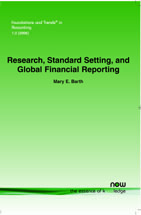Research, Standard Setting, and Global Financial Reporting
By Mary E. Barth, Joan E. Horngren Professor of Accounting, Stanford University, Graduate School of Business, USA, barth_mary@gsb.stanford.edu
Abstract
The objective of this paper is to aid researchers in conducting research relevant to global financial reporting issues, particularly those of interest to financial reporting standard setters. The mission of the International Accounting Standards Board (IASB) is to develop a single set of financial reporting standards that are accepted worldwide. The Financial Accounting Standards Board (FASB) is committed to convergence of its standards with those of the IASB. Thus, global financial reporting issues relate to particular topics on the agendas of the IASB and the FASB. They also relate to globalization of financial reporting itself. This paper discusses research related to both types of issues and explains how that research can aid standard setters in resolving global financial reporting issues as well as contribute to the academic literature. The issues facing global financial reporting standard setters are broad, difficult, and complex. Research can provide input to their resolution. To do so, researchers need to understand not only the issues themselves, but also how to develop research questions and designs that are relevant to the issues, from the perspective of both standard setting and the academic literature.
Research, Standard Setting, and Global Financial Reporting
Research, Standard Setting, and Global Financial Reporting aids researchers in conducting research relevant to global financial reporting issues, particularly those of interest to financial reporting standard setters.
Research, Standard Setting, and Global Financial Reporting describes the relation between research and standard-setting issues; explains how a variety of research designs can be used to address questions motivated by standard-setting issues, including valuation research and event studies; offers examples of research addressing a specific global standard-setting issue - use of fair value in measuring accounting amounts; offers further opportunities for future research on specific standard-setting topics by providing motivating questions relating to the major topics on the agendas of the FASB and IASB; explains how the IASB aims to achieve its mission of developing a single set of high quality accounting standards that are accepted worldwide; summarizes extant evidence on the relative quality of accounting amounts across global standard-setting regimes and whether global financial reporting is achievable or even desirable.
Research, Standard Setting, and Global Financial Reporting examines opportunities for future research on issues related to globalization of financial reporting by identifying motivating questions that are potentially avenues for future research.
